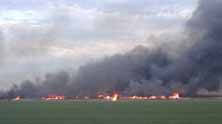
Toxic smoke and particulates fill the sky at Cornhusker Army Ammunition Plant’s three-quarter-mile-long Load Line 1. Photo by U.S. Army Operations Support Command, 2002.
MERRIMAC – In response to community concerns about the release of contaminants during the proposed burning of buildings at Badger Army Ammunition Plant, Senator Russ Feingold has sent a letter to the U.S. Army concerning the viability of less polluting alternatives.
Feingold is specifically questioning whether or not the Army evaluated alternative technologies that might be effective in addressing the contaminants present in buildings and would limit the emissions of pollutants to the environment. Feingold also wants to know if alternative technologies would pose fewer risks to building deconstruction workers than open burning.
According to Feingold’s letter, the U.S. Army Environmental Center has developed a Hot Gas Decontamination (HGD) technology which uses controlled heat to volatilize and thermally decompose the explosive contamination. The technology, which has been demonstrated at Cornhusker Army Ammunition Plant, Hawthorne Army Depot, and Alabama Army Ammunition Plant, was proven to be effective in reducing environmental emissions in decontaminating explosive-contaminated equipment and facilities, Feingold said.
In a companion letter to Citizens for Safe Water Around Badger, a local community-based group that is watch dogging the cleanup and conversion of the closing base, Feingold responded favorably to the group’s request for federal funding to research and develop alternatives to open burning.
As part of the FY 2004 Defense appropriations bill, Feingold supported funding for the Strategic Environmental Research and Development Program (SERDP), a federal program designed to identify, develop, and transition environmental technologies that relate directly to defense mission accomplishment.
“The bill is now before the House-Senate conference committee which is working to develop a final FY2004 Defense appropriations bill,” Feingold said. “As the conference proceeds, I will monitor funding in the SERDP account closely. If you have information regarding the Army’s FY 2005 SERDP needs at Badger, I would appreciate receiving it.”
CSWAB, together with other members of the Badger Reuse Committee, is seeking the highest quality cleanup at Badger.
“Members of the committee, which includes local, state, and tribal government, unanimously agree that cleanup should pose no risk to people or the environment,” said Laura Olah, Executive Director of CSWAB. “The final reuse plan stipulates cleanup should not contaminate nor pose the threat of additional contamination of the Badger property. Senator Feingold’s response demonstrates his commitment to a safe and healthy future for Badger.”

